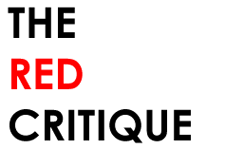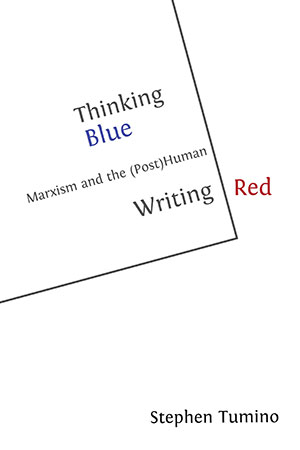
Thinking Blue/Writing Red: Marxism and the (Post)Human
Stephen Tumino
 Thinking Blue/Writing Red interrogates contemporary culture across a range of texts, from the
pandemic ('Covid' and 'Trump Speak') to high theory (Melville's
narratives) and popular culture (Beyoncé's 'Formation' and Super Bowl
performance, Twin Peaks, metamodern 'cli-fi' films). Inspired by
Derrida’s idea of the secret, Tumino examines the significance of social
movements (Black Lives Matter, Occupy, alter-globalization) and naïve
art (Darger, Ryden) to argue that these texts speak of the secrets that
capitalism cannot speak. Contending that the cultural surfaces narrate
only the 'nonsecret,' that to see the social logic of the culture one
must dig into what Bruno Latour questions as the 'deep dark below,'
Thinking Blue/Writing Red reads these texts to tease out the
underlying narratives of the culture of capital.
Thinking Blue/Writing Red interrogates contemporary culture across a range of texts, from the
pandemic ('Covid' and 'Trump Speak') to high theory (Melville's
narratives) and popular culture (Beyoncé's 'Formation' and Super Bowl
performance, Twin Peaks, metamodern 'cli-fi' films). Inspired by
Derrida’s idea of the secret, Tumino examines the significance of social
movements (Black Lives Matter, Occupy, alter-globalization) and naïve
art (Darger, Ryden) to argue that these texts speak of the secrets that
capitalism cannot speak. Contending that the cultural surfaces narrate
only the 'nonsecret,' that to see the social logic of the culture one
must dig into what Bruno Latour questions as the 'deep dark below,'
Thinking Blue/Writing Red reads these texts to tease out the
underlying narratives of the culture of capital.
This book will be of interest to students in several disciplines,
including philosophy, literary and cultural studies, film studies,
women's studies, critical race studies, history, LGBTQ+ studies and
environmental studies.
I believe Tumino’s book makes an important and necessary contribution to radical discourse through its encompassing and sophisticated critique of mainstream media, higher education, pop culture, and political economy. - Prof. Steven Wexler, California State University, Northridge
The book is a ground breaking, comprehensive, and lively engagement with the contemporary (post)humanities and neoliberal culture industries. It challenges their institutionalized common sense while reconfiguring the intellectual and political issues in a way that draws out their implications for academic and non-academic readers alike. - Prof. (Emerita) Teresa L. Ebert, University at Albany, SUNY
Stephen Tumino's Thinking
Blue/Writing Red is an encompassing and enlightening exploration
of the (post)neoliberal cultural topography of contemporary
capitalism that is as impressively relentless in its analysis as it
is wide ranging in its scope. It is a rigorous and scholarly, as
well as readable and engaging, analysis of the contemporary that
will be accessible to a wide audience of academic and non-academic
audiences alike. It will educate and challenge readers to consider
the social forces which shape their daily lives. - Dr. Robert
Wilkie, University of Wisconsin-La Crosse